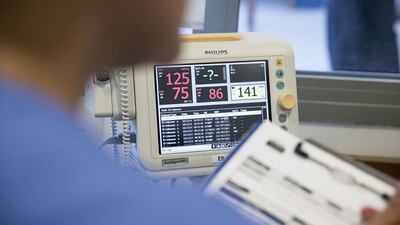Like many aspects of our lives, health care is shifting from the institutional and the impersonal, to the specialist and personalised. Policy and attitudes are changing globally because a growing body of research shows that health care is more cost-effective if delivery is separated into acute care – by hospitals – and post-acute care that could be in a variety of specialist facilities, or even in the home.
Recovery times are also often much shorter if care facilities are more tailored to patient needs. Meanwhile, introducing specialist alternatives means that hospitals can free up valuable beds for those who need them most.
The UAE is starting to embrace this trend, as patients here change a fairly ingrained belief that large institutions must have better facilities, more experts, and therefore better care.
Hospitals are vital for treating emergencies such as heart attacks and strokes, and acute conditions such as bone breaks. But treatment for rehabilitation and long-term chronic conditions, such as diabetes and kidney disease, can take place in other specialist facilities or at home.
Research in the US suggests that too much exposure to hospitals may encourage dependency on them. For example, a study of people who received hernia operations in California showed that those who had been in hospital at some point in the 90 days leading up to the operation were twice as likely to visit the emergency department in the month after the operation, and five times as likely to be admitted again.
The researchers concluded that previous hospital stays had “detuned” these patients from their normal daily lives, making them more vulnerable to complications arising from the hernia operation, even though it is a very straightforward procedure.
It is difficult to pinpoint the reasons for this, but many doctors suggest frequent hospital treatment has a psychological effect, and maybe also a physical effect. Sleep rhythms are disrupted, physical activity is reduced, routines are changed and patients feel control over their daily lives passes to strangers.
Private rehabilitation facilities and home-care services are becoming increasingly popular because they allow patients to lead near to normal lives in a familiar environment. Many patients have returned from expensive hospital care abroad, where they not only had to deal with illness, but also unfamiliar institutions and culture.
The proliferation of non-hospital care is also helping to alleviate the strain on hospitals.
A 2014 health report published by Health Authority Abu Dhabi found that intensive care units in Abu Dhabi were critically overstretched and understaffed, with ICUs at government-run hospitals almost all at 100 per cent capacity. International studies suggest many patients do not really need to be in hospital. In the UK, where critical care bed occupancy rates hover around 85 per cent, a 2015 audit found that up to 50 per cent of bed days could theoretically take place in other settings.
In the UAE, hospitals are increasingly looking to free up ICU beds by discharging patients into specialist facilities, and to their homes, in the knowledge that home care is available. Typically, this would be appropriate for patients recovering from strokes and trauma, neurological conditions and long-term congenital conditions.
As the Government and patients themselves see the benefits of post-acute out-of-hospital care, I believe the specialised private healthcare sector in the UAE has a chance to flourish, with a wide array of facilities and services on offer while being more cost-effective and more personalised and customised for the patient.
What is required to get there is a clear commitment by the public sector to cooperate with the private sector for the benefit of both, rather than competing with private facilities and providers; and for patients, it is a lot of awareness that has to be created that private non-hospital care is viable, well established and delivers excellent results.
Dr Helmut Schuehsler is CEO of TVM Capital Healthcare Partners, a healthcare private equity firm that invests in the Mena region

